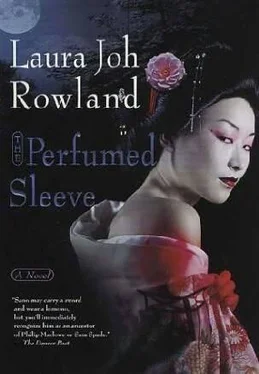“Yes, indeed,” Rakuami said.
Hirata looked askance at him. "Okitsu was a pretty young girl. Makino was a mean, ugly old man. But she liked him anyway?”
“Very much.” Rakuami was no longer smiling; his manner turned defensive. Otani frowned.
“He paid for her favors, so she was forced to serve him, but she enjoyed it because she liked him,” Hirata said with disdainful skepticism.
“All right, she wasn’t fond of him. But that didn’t matter. She behaved very nicely toward him.” Rakuami’s face now glistened with sweat as well as grease. “All my girls do toward their clients.”
“Can your girls and your servants confirm what you’ve told me?” Hirata said. “Go ask them,” he ordered the detectives.
“Wait.” Rakuami raised his hand, loath to disrupt the party. Hirata motioned the detectives to stay. Rakuami said reluctantly, “The first time Makino asked for Okitsu’s company, she begged me not to make her serve him. She said he frightened her. The very sight of him made her sick. She said she hated him. But I told her she’d better make him happy because he was an important client.”
“And she made him so happy that he wanted her all to himself,” Hirata deduced, glad that he’d finally gotten the upper hand. “Did he buy her from you?” When Rakuami nodded, Hirata said, “How did Okitsu like the idea of being concubine to a man who frightened and revolted her?”
Rakuami’s gaze roved the room, avoiding Hirata. “It was an advantageous opportunity for Okitsu. When my girls get too old to attract clients, I have to let them go. I can’t afford to keep them if they’re not earning money. A lot of them end up begging on the streets.” He spoke with casual indifference to their fate. “For Okitsu to latch onto a rich, powerful man like Makino would secure her future.”
“But she didn’t want to live with him,” Hirata said, perceiving the truth that Rakuami wanted to deny.
“She’s young and foolish,” Rakuami scoffed. “She didn’t know what was best for her. I told her that Makino would give her a good home. She would have to serve only one man instead of many.”
“What happened when Okitsu found out you were selling her to Makino?”
Rakuami hesitated, licking his moist lips.
“I’m sure there’s someone else here who will tell me.” Hirata started to rise; the detectives followed suit.
Rakuami grimaced in annoyed resignation. “Okitsu tried to commit suicide,” he said in a flat, low voice that his guests wouldn’t hear.
“How?” Hirata said as he and the detectives resettled themselves.
“She jumped into the canal behind the house and tried to drown herself,” Rakuami said. “But some boatmen rescued her. I sent her to Makino’s house the next day.”
Otani broke into the conversation: “This is irrelevant. The girl tried to hurt herself, not Makino. We’ve heard nothing to suggest that she murdered him.”
“Maybe Makino treated her badly while they lived together,” Hirata said. “Maybe Okitsu was desperate to be rid of him, and she decided she would rather kill Makino than herself.”
“Maybe you’re making up stories that you want to believe,” Otani mocked Hirata. Then he said to Rakuami, “Thank you for your assistance. We won’t trouble you any longer.”
He and his men stood, as did Chamberlain Yanagisawa’s watchdogs. Rakuami jumped to his feet, bowed, and smiled, relieved to end Hirata’s interrogation. “To serve you is my pleasure,” he told Otani. “Perhaps you’ll do me the honor of visiting me again some other time?” His expansive gesture offered Otani his girls, food, drink, and music.
“I will,” Otani said.
Hirata and his detectives also rose, but Hirata said, “We’re not leaving yet. First, we’ll see what everyone else here has to say about Okitsu.”
He began separating girls and servants from the clients, who hastily absconded rather than get involved. Rakuami watched in helpless outrage. Hirata took a malicious, shameful pleasure in causing Rakuami trouble while forcing Otani and the other watchdogs to observe a tedious round of interviews. And although the interviews produced nothing more than Rakuami had told him, Hirata felt relieved that despite Otani’s hindrance, he’d discovered that Okitsu had a motive for the murder. He would have something to report to Sano.
At last, he and his party left the house. When they went outside to reclaim their horses, Otani drew Hirata aside and spoke in a confidential tone: “There’s something I must tell you, for your own good.”
Hirata eyed him warily.
“The sōsakan-sama is making a big mistake by conducting the investigation in this way,” Otani said. “If you follow his lead, you’ll go down with him. Do yourself a favor. Cooperate with me. Protect your own future.”
“Are you saying I should defy my master’s wish for the truth about the murder and conspire with you to incriminate the chamberlain so that Lord Matsudaira will reward me?” Hirata stared in disbelief at Otani’s puffy face.
“You needn’t put it so bluntly,” Otani said.
That Otani should try to suborn his loyalty to Sano! Enraged, Hirata wanted to lash out at Otani for insulting him and criticizing Sano’s judgment. But he mustn’t offend Otani and risk bringing Sano more trouble.
“Thank you for your offer, but I must decline,” he said with all the control he could manage.
Otani shrugged. “The offer stands, in case you come to your senses.”
Hirata was suddenly overwhelmed by fear that unless he could be free to carry out his inquiries without constant pressure, he would ultimately fail. Turning his back on Otani, he climbed on his horse and joined the detectives, who already sat astride their mounts, and whispered orders to them. As everybody rode away from Rakuami’s house, one detective suddenly bolted ahead. Another cantered his horse in the opposite direction. Another turned left at the intersection, while the last turned right.
“Where are they going?” demanded Otani.
“To follow some leads for me,” Hirata said.
Otani shouted at his men to go after the detectives. Chamberlain Yanagisawa’s men joined the pursuit. In the general confusion, Hirata slapped the reins and galloped away.
“Hey! Come back here!” Otani yelled.
As Hirata rode, he heard hooves pounding behind him as Otani gave chase. But he knew Nihonbashi better than Otani did. He veered down alleys, cut across marketplaces, and soon lost his watchdog. An exhilarating sense of freedom filled him as he raced alone through the wind and sunshine, bound for Asakusa Jinja Shrine, to investigate Senior Elder Makino’s wife.
Reiko alit from her palanquin in the Hibiya administrative district south of Edo Castle, in front of a mansion that belonged to her father, one of two magistrates who maintained law and order in Edo. She sent home the palanquin and her escorts, then carried a cloth-wrapped bundle to the gate. The sentries opened it for her, and she hurried through the courtyard, where police officers guarded shackled prisoners awaiting trial by the magistrate. Inside the mansion, she bypassed the public chambers that housed the Court of Justice. She went to the private quarters and closed herself inside the room that had been hers during her childhood. Ensconced amid the familiar teak cabinets, lacquer furniture, raised study niche, and painted murals of blossoming plum trees, she knelt on the tatami floor and opened her bundle.
It contained two plain indigo cotton kimonos with matching sashes, two white cotton under-robes, coarse white socks, a padded cotton cloak, and straw sandals-typical clothing for servants. Wrapped inside the clothing were a rice bowl and chopsticks, a comb, hairpins, a head kerchief, a Buddhist rosary, and a few copper coins. The only item not normally owned by a maid was a dagger in a leather sheath. Reiko changed her silk robes for the rough cotton clothes, then sat at the dressing table and studied her reflection in the mirror.
Читать дальше












